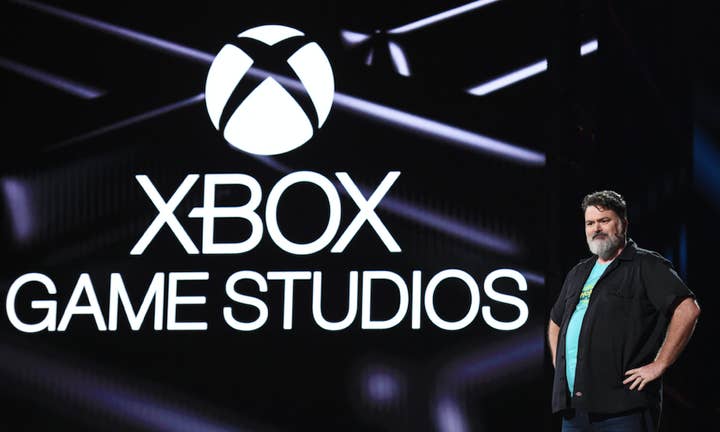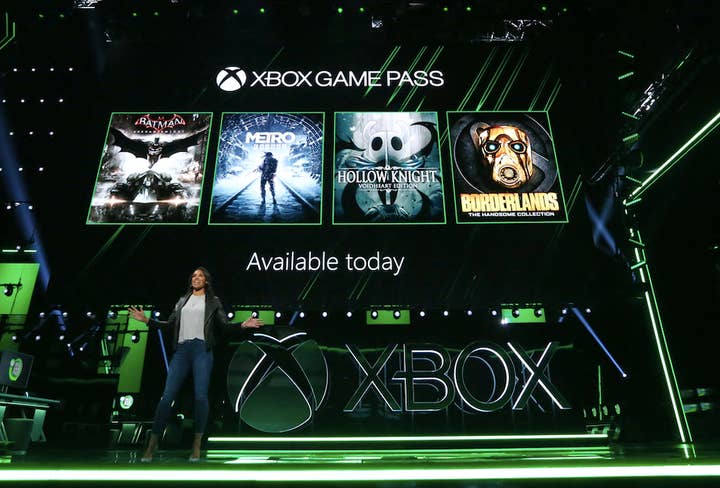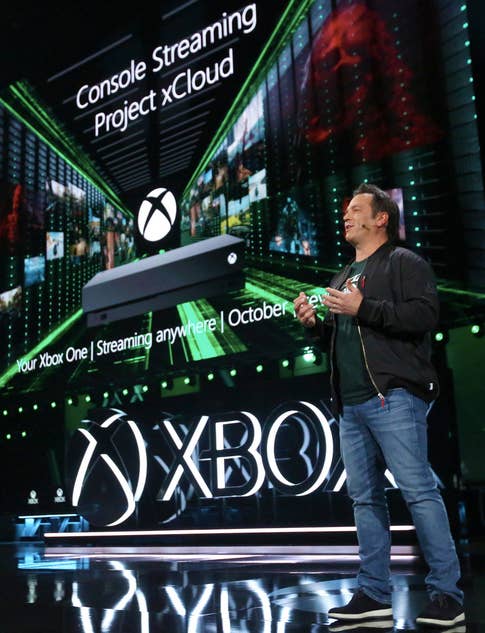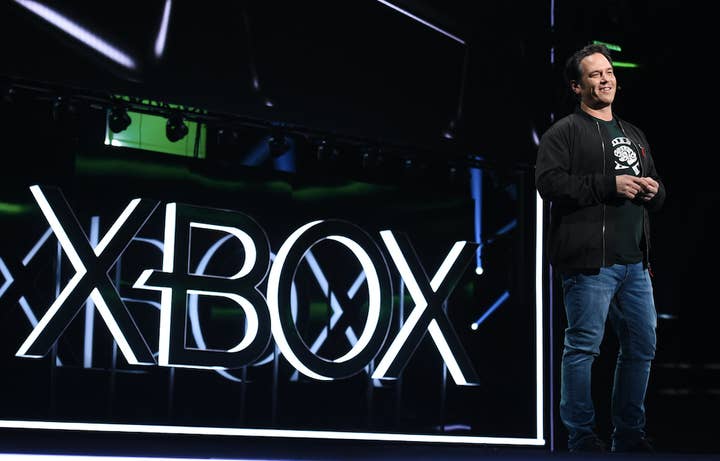Phil Spencer: "It would be nice to buy a Japanese studio"
The head of Xbox on Game Pass, the impact of streaming, and why he's not afraid of Google
It was always destined to be Xbox's E3.
Unimpeded by its biggest competitor for the first time in its history, Microsoft could have shown up with just a smattering of new announcements and still have claimed E3 for its own. The fact that it did so with a showcase crammed with games, new hardware, new services, two new studios and a Keanu Reeves, spoke to the fact that Xbox is taking no chances.
There was one thing that united all of Microsoft's E3 reveals -- from Halo Infinite to Project Scarlett, and Project xCloud to Gears 5 -- and that was Game Pass. The subscription service was the one constant throughout Xbox's E3 conference. Over half of the 60 games on show will be debuting in Game Pass, and Microsoft's studio expansion and acquisition strategy is almost entirely influenced by this business model.
Double Fine is the latest high-profile company to join the Xbox family of in-house developers, and its objective (alongside its 14 sister studios) is to create games that can be used to attract and retain Game Pass customers.
Speaking to GamesIndustry.biz, head of Xbox Phil Spencer admits that the spending spree is by no means over. The strategy will be familiar to anyone who has followed the Netflix story. The TV streaming platform reportedly spent between $12 and $13 billion on content last year, and that number is expected to rise this year.
"It's not every year that we'll add seven new studios, but I do think us looking at specific targets that we need is important"
"They're growing their business," Spencer notes. "I think they've done a very good job of investing into where they see the business is going. For us as Microsoft, it is one of the things about having the support of the company behind us. Satya Nadella, our CEO, and Amy Hood our CFO, and our board, see gaming as an important growth category. You can look at our P&L of our company; we're not spending $12 billion on video games today, but as the subscriptions grow and reach more customers, I do think it's important for us to continue to invest in content. It's not every year that we'll add seven new studios, but I do think us looking at specific targets that we need is important."
There is no acquisition quota for Spencer and his team to hit. Instead, the aim is to find developers that can add something different for Game Pass.
"One of the things I love about Tim [Schafer] and the team at Double Fine is that they build different games to what our other studios build," he says. "And that's a strength. Because just like in video, just like in music, there isn't one song that everybody loves. There isn't one movie, or even a genre that everybody loves. So with Game Pass, we think about millions of different players and the different kind of games they will play. That diversity is really important."
He continues: "I think it would be nice if we found an Asian studio, in particular a Japanese studio, to add [to our studios]. I liked it when we had some first-party capability in Japan. We have a small team there, but I think we can do more. That said, through our trips to Japan, I love having Phantasy Star back on our stage with Sega -- I thought that was fantastic. Miyazaki-San, before with Dark Souls and now having Elden Ring on our stage... the Japanese creators have shown up more and more."

If Game Pass is to keep growing, then Microsoft needs to buy studios or acquire content. Although it has a strong array of classic games, it needs new titles to not just bring Game Pass subscribers in, but keep them there. Although there are third-party releases included in Game Pass, they have primarily been legacy games or smaller, independent projects.
In fact, the bigger third-parties are either developing their own subscription services (such as EA and Ubisoft), or are entirely dismissive of the economics behind it. Take-Two CEO Strauss Zelnick said just last month that a frontline subscription model is a "terrible deal for publishers."
"I will say today that the partners we have in Game Pass are seeing that they're finding more players with their games," defends Spencer. "For us, we look at our first-party games that we premiere in Game Pass... we sell more copies of those games than we think we would have if they weren't in Game Pass. Because today, game marketing is as much about what the community is playing as it is about having an ad somewhere. So State of Decay 2 was a game that premiered in Game Pass, and when it came out it instantly had millions of people playing, which raised the awareness of that game.
"Today, game marketing is as much about what the community is playing as it is about having an ad somewhere"
"We had 34 games on our [E3] stage that are premiering on Xbox Game Pass, and we are finding great support from our partners. But we're always listening as well. I am not going to say that we always have every answer to every situation. Today, players love it; we launched Game Pass for PC, with over 100 games for a PC player, and then we created Ultimate [a new subscription tier featuring Game Pass for console, PC, and Xbox Live Gold]. I think we had such a reaction when we announced it that our store stalled a little bit."
Spencer continues: "I would say the thing about Game Pass, relative to maybe some other subscriptions out there, is just its scale. Game Pass is at a point where it has millions and millions of subscribers. When you put a game into Game Pass, you've instantly reached millions of people who can play your game. If you have anything to buy in the game, if there is add-on content, you are obviously reaching more players.
"But it does just raise the awareness. One of the games that I'm playing right now is Outer Wilds. I think that is a fantastic game for Game Pass. Because it is a great game -- you have to tick that box -- and it's not an IP that anyone knows, and you're not going to see a television ad for it. So it launches into Game Pass, yes, some people will choose to subscribe to play it, but many people will choose that they want to own their games, which is why we offer that choice. And on PC we are even giving you choice on which stores you want to buy. We put our PC games on Steam and our own store."

Spencer repeatedly drops PC into the conversation because it is a big deal for Xbox. Project Scarlett may have been the exciting new console announcement, but ultimately it's another tool to get people into Game Pass. And PC plays the same role.
Yet Xbox's PC activity is easy to dismiss because we've been here before. Several times, in fact. We're told how vital PC is to Microsoft's plans, only for that to be a handful of Xbox ports and maybe an Age of Empires.
"The next step for us is showing the PC player that we are as committed as we are on console [with Game Pass]," Spencer says. "When we launched on console two years ago, there were some questions from the community on how it's just old games and 'I don't know if I want to subscribe,' which was fair. We saw the subscribers grow, and then we added our first party in, now we have a lot more third-parties that are premiering their games. It has become a really positive force in gaming, my opinion.
"We are in this space in gaming where we are one of the few industries that still sell content for $60"
"So I think we have that same journey with the PC customer. The customer that doesn't own an Xbox, doesn't own a console -- doesn't want to, either - they want to play on PC. There's a healthy amount of scepticism on whether we are really true to that customer. Or is this just another ploy for us to get them to buy an Xbox? Which it is not. So I think our next step, honestly, is to deliver on that promise of PC Game Pass.
"But I think if you look out, you say: I want to have some way of getting access to games, I can buy a gaming PC, I can buy a console, maybe there's something I can subscribe to that gives me access to [a console] in the cloud. Then I want to have a subscription with the games that I want to be able to play. I think there is an unlock to getting more people to play, by making the acquisition of games easier for more people. We are in this space in gaming where we are one of the few industries that still sell content for $60. But we know that when you reach the broadest market, then having a more variable pricing model that allows people to come in where they can afford to come in, is important."
The third way to access Game Pass will be Project xCloud. The streaming service is Microsoft's way to bring in the huge gaming population who don't own a PC or a console. But Spencer isn't expecting that to happen overnight, and he believes that, for most gamers, xCloud will be additional.

"We know that the first customers for xCloud are going to be people who own an Xbox. It's going to be, 'Oh, I want to play my Xbox when I'm away.' Last month, Catherine [Gluckstein, chief of staff/strategy for Xbox] and I were in Africa. Not a lot of Xboxes in Africa. Not a lot of game consoles. 1.2 billion people on the continent of Africa. Average age is 19 on the continent. They know Fortnite, they know Halo, they know Gears of War. They just don't have a device.
"There are gamers there, but the device they have is an Android phone. So today they are kind-of locked out of what an E3 is -- outside of watching -- because of the capability they have.
"When I think about the two billion [gamers worldwide], which is a number that has tripled over the last two decades, I really think about how we service the two billion who play today with as much content and services as we can offer, but also go to places like Africa. I was looking at some of the PUBG mobile numbers in India and they're crazy -- they've had 100 million downloads or something. You see these markets where gaming can grow to the next two billion or even more.... There are seven billion people on the planet. For me, I think they should all play video games."
Of course he does, and streaming could be the magic solution to getting someway there. But Spencer doesn't expect it to suddenly replace console hardware.
"We have more devices around us than we ever had. It is not that the cloud has moved everything that you do and we are all just carrying dumb devices. That thing [points to smartphone] is as powerful as an original Xbox, maybe even as a Xbox 360. So this world... where all your local devices go away, and everything is in the cloud, isn't the world that I see today. What I see today -- and what we call it at Microsoft -- is the hybrid cloud. There's local compute more and more around us, but everything is synchronised via the cloud, and in certain cases delivered via the cloud.
"There are these nearly trillion dollar market cap... some of the biggest companies on the planet are here at E3"
"The highest fidelity experience in gaming, for years, will be playing from a local device that has a direct connection to that television, and a direct connection to your games. I am not trying to tell you that xCloud is going to be a higher fidelity experience than the experience you have today on a console. It is another choice for you to play, but it is a different choice."
'Choice' is a bit of a corporate slogan for Microsoft, yet it originated from a time, way back at the launch of Xbox One, when it didn't offer consumers choice. Today, the original Xbox One plans seem ahead of their time, but Microsoft learned the hard way that you can't force change.
"When we talk about xCloud, we don't say 'your console is bad, you should stream' or 'stop playing on your PC.' You want to buy a game, download a game, and play it on your local Xbox or PC, we give you a ton of options to do that. We see cloud as a way of extending the experience that you're having, to a device that today you can't go play those games [on]. But we are not trying to tell you that that's the only choice. The thing about being too early is when I try to tell you what you should do. That's when I'm not being a platform that's listening."
Unlike streaming, Game Pass is becoming a proven business model. It's had a rapid take up from the Xbox audience, it is generating strong revenue, it is aiding discovery, and now there's a large group of console players that own the same line-up of games. There are questions about whether the commercials add-up for developers and publishers, and whether gamers really play enough titles to justify a monthly fee, but there is clearly strong momentum behind the model.
Yet models like this, concepts such as streaming, and that two billion gamer number that Microsoft throws around are attracting some major competitors. Sony may not be at E3 this year, but there are arguably some even bigger entertainment companies to be afraid of who are.
"I am not really afraid of much. Maybe that's a downside of me," Spencer concludes. "I think it is an interesting E3 this year. Phil [Harrison] did his thing on Thursday with Google Stadia. Amazon is here with Twitch. I can see purple everywhere around. I know Netflix is over doing a talk. I am old enough to remember E3 back when it was THQ and Sega, and Xbox were the new kids coming in. But now you look at the companies that are here, and there are these nearly trillion dollar market cap... some of the biggest companies on the planet are here at E3.
"The thing that gives me strength is that we've been in this industry for decades. We have great partnerships with creators and the other platform companies. I am a big publisher on Sony and on Nintendo. The fact that we are part of the games industry, and have been for many years, helps us as we look forward. But clearly, as other big companies are coming in and investing, it is a fun time to be in the industry right now. But I wouldn't say I'm afraid."

